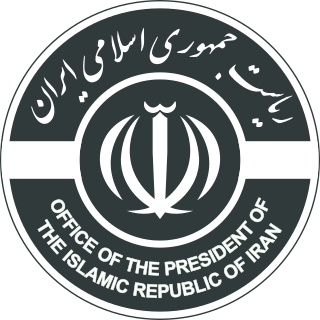
The president of Iran is the head of government of the Islamic Republic of Iran. The president is the second highest-ranking official of Iran after the Supreme Leader.

Artsakh, officially the Republic of Artsakh or the Republic of Nagorno-Karabakh, is a breakaway state in the South Caucasus whose territory is internationally recognised as part of Azerbaijan. Its population is predominantly of Armenian ethnicity, Christian, most being affiliated with the Armenian Apostolic Church, and the primary spoken language is Armenian. Between 1991 and 2023, Artsakh controlled parts of the former Nagorno-Karabakh Autonomous Oblast (NKAO), including the capital of Stepanakert, functioning as a de facto independent republic, even though no United Nations member state recognized it. Artsakh has been an enclave within Azerbaijan. Its only overland access route to Armenia is via the 5 km (3.1 mi) wide Lachin corridor.
There are five types of elections in Slovakia: municipal elections, regional elections, parliamentary elections, presidential elections and elections to the European Parliament. All four types of elections are normally held after fixed periods, although early elections can occur in certain situations. Elections are conventionally scheduled for a Saturday - the polls normally open at 7:00 in the morning and close at 22:00 in the evening. Citizens aged 18 years or older are eligible to vote. Those serving prison sentences for particularly serious crimes, as well as those deprived of legal capacity, including persons with mental disabilities, are denied the right to vote. Voter registration is passive and decentralized with the voter register maintained by municipalities based on the permanent residence register. Voter lists are updated continuously based on municipal records and input provided by state institutions or other municipalities. Voters may verify their data in voter lists, and, if necessary, request correction until the day before election day. On election day, a voter can be added to a voter list upon presenting an identity card with proof of residency. Some 4.4 million voters are registered and valid to vote in the elections. Voters are only able to vote from abroad during the Parliamentary Elections in Slovakia.

Politics of Artsakh takes place within the constraints of a written constitution, approved by a popular vote, that recognises three branches of government: executive, legislative and judicial. The executive branch of government is exercised within a framework of a presidential representative democratic republic, whereby the President of Artsakh is both the head of state and the head of government. The legislative branch of government is composed of both the Government and the National Assembly. Elections to the National Assembly are on the basis of a multi-party system. As of 2009, the American-based non-governmental organisation, Freedom House, ranks Artsakh above both Armenia and Azerbaijan in terms of political and civil rights. The republic is de facto independent and de jure a part of Azerbaijan. None of the elections in Artsakh are recognised by international bodies such as the OSCE Minsk Group, the European Union or the Organisation of Islamic Cooperation. Both Azerbaijan and Turkey have condemned the elections and called them a source of increased tensions.

The National Assembly of Armenia, also informally referred to as the Parliament of Armenia is the legislative branch of the government of Armenia.

The president of the Republic of Artsakh is the head of state and head of government of the de facto Republic of Artsakh.

The Republic of Artsakh is a republic with limited recognition in the South Caucasus region. The Republic of Artsakh controls most of the territory of the former Nagorno-Karabakh Autonomous Oblast. It is recognized only by three other non-UN member states, Abkhazia, South Ossetia and Transnistria. The rest of the international community recognizes Artsakh as part of Azerbaijan. In November 2012, a member of Uruguay's foreign relations committee stated that his country could recognize Nagorno-Karabakh's independence. In 2012, Armenia and Tuvalu established diplomatic relations and it was expected that Tuvalu may recognize Artsakh's independence. In October 2012, the Australian state of New South Wales recognized Nagorno-Karabakh. In September 2014, the Basque Parliament in Spain adopted a motion supporting Artsakh's right to self-determination and in November 2014, the Parliament of Navarre, also in Spain, issued a statement supporting Artsakh's inclusion in taking part in settlement negotiations.

Presidential elections were held in the Nagorno-Karabakh Republic on 19 July 2007. Incumbent president Arkady Ghukasyan was constitutionally barred from seeking a third term and endorsed Bako Sahakyan, who was the head of the National Security Service. Sahakyan was supported by the ruling Democratic Party of Artsakh, two opposition parties and the Armenian government.

Bako Sahaki Sahakyan is an Artsakhi politician who served as the third president of the de facto-independent Republic of Artsakh from 2007 to 2020. He is the longest-serving president of Artsakh.

Arayik Vladimiri Harutyunyan is an Artsakhi politician who served as the fourth president of the de facto-independent Republic of Artsakh from May 2020 to September 2023. Under his predecessor Bako Sahakyan, he served as the sixth and last Prime Minister from 2007 until the abolishment of that position in 2017 and as the first State Minister of the Republic of Artsakh from 2017 until his resignation in 2018. Harutyunyan led Artsakh through the 2020 Nagorno-Karabakh War with Azerbaijan, during which the republic lost most of the territory under its control. He resigned on 1 September 2023 in the midst of the Azerbaijani blockade of Nagorno-Karabakh.
This page list topics related to the Republic of Artsakh and Nagorno-Karabakh region.

Vitaly Mikhaili Balasanyan is an Artsakhi politician and retired general. He served as the head of the National Security Council of the self-proclaimed Republic of Artsakh from November 2016 to November 2019 and again from December 2020 to January 2023. For his services in the First Nagorno-Karabakh War, he was awarded the country's highest title, Hero of Artsakh. He previously served as a member of Artsakh's National Assembly. He twice ran, unsuccessfully, for the office of President of Artsakh.

A constitutional referendum was held in the unrecognised Republic of Nagorno-Karabakh on 20 February 2017. At least 25% of registered voters needed to vote in favour in order to validate the result. The referendum passed with about three quarters of voters voting.
General elections were held in the Republic of Artsakh on 31 March 2020, with a second round of the presidential election on 14 April. Voters elected the President and 33 members of the National Assembly. It was the first time the President and National Assembly were elected at the same time.
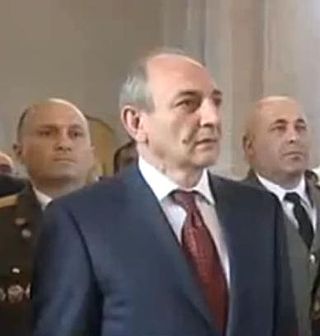
Indirect presidential elections were held in the unrecognised Republic of Artsakh on 19 July 2017. The incumbent, Bako Sahakyan, was elected to a third term.
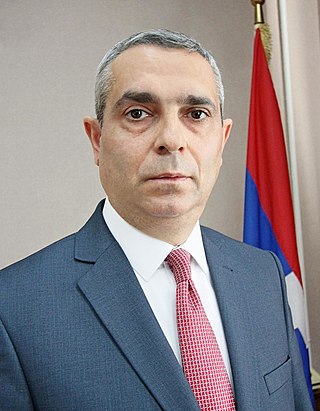
Masis Samveli Mayilyan is an Artsakhi politician, diplomat and former presidential candidate. He is currently serving as ambassador-at-large of the Republic of Artsakh. From September 2017 until January 2021, he served as the Foreign Minister of Artsakh.
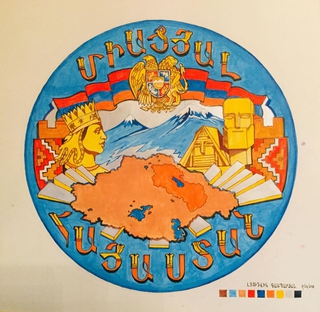
The United Armenia Party is an Armenian political party in Artsakh.
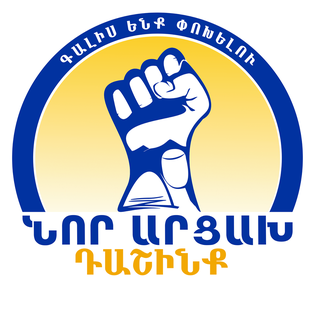
The New Artsakh Alliance is an Armenian political alliance in Artsakh.

The Artsakh Revolutionary Party is an Armenian political party in Artsakh.
The Republic of Artsakh and the United States do not have official diplomatic relations as the United States is among the vast majority of countries that does not recognize Artsakh as a sovereign nation and instead recognizes the region of Artsakh, or Nagorno-Karabakh, as part of Azerbaijan. Despite no formal relations, the Republic of Artsakh has a representative office in Washington, D.C. since November 1997.













